- Home
- Diana Wynne Jones
Witch's Business Page 7
Witch's Business Read online
Page 7
“Stop it!” shrieked two younger ones.
“I say! This is a bit thick!” said a guest. “What’s going on?”
“You boil your head,” said Buster, “if you can’t stop her.”
The guest opened and shut his mouth. Before he could say anything, a French window in the side of the house came crashing open, and out onto the lawn came leaping a rather tubby man with a ginger mustache. After him came Martin.
“You bunch of little hoodlums!” roared this man. He came leaping and bounding down on Buster. “Get out of here, or I’ll call the police!” he shouted. Jess realized he must be Mr. Taylor, and she blessed Martin for fetching him.
“Save your breath,” said Buster. “We’re just going.” This was true. The rest of the gang, at the mere sight of Mr. Taylor, went scuttling away across the croquet lawn. Stafford was picking himself up to follow. Buster was poised on one leg, ready to run, but he just could not resist being rude first. He put out his tongue before he ran.
Mr. Taylor gave a roar like a lion’s and fetched him a swipe that must have made his head ring. “That’s for your impertinence!” he said. “Get out!” Buster staggered, shook his head—not meaning to say no, but because his ears were singing—and ran like a weasel after the rest. Mr. Taylor swung round at Jess. “And you! What do you think you’re doing, messing up the croquet like this?”
“We’re sorry,” said Jess.
“She’s a friend of mine,” Martin said quickly. “They all are, Dad.”
“They were chasing us, Mr. Taylor,” Vernon explained, limping up beside Martin.
Mr. Taylor looked them all over, including Frankie and Jenny, pulling his mustache suspiciously. “Oh, they are, are they?” he said. Then he took a dive round at Martin. “Then, if they’re your friends, boy, you should know better than to let them create this kind of disturbance. All over the croquet! It’s too bad, Martin! Get them away. Take the lot of them inside and give them tea, or something. Only—” Mr. Taylor put his hands in the air and roared again, until everyone’s ears throbbed. “Only get them out of it!”
“Yes, Dad,” said Martin.
SEVEN
Five minutes later, they were all sitting stiffly in a small, clean sitting room, and Mrs. Taylor was setting out tea things on several little round tables. She would not let Jess help, nor Frankie and Jenny. For some reason, she seemed to think that the two Adams girls were Jess’s sisters.
“Aren’t they sweet!” she said. “You must feel like a little mother to them.”
“Not quite, really,” Jess said, while Frankie and Jenny sat side by side on a sofa like two fierce mice and glared from Jess to Mrs. Taylor.
“I love little girls!” said Mrs. Taylor. “I’ve always wanted one of my own. I make a lot of fuss of Vernon’s little sisters. Don’t you think they’re sweet?”
“Yes,” said Jess, and Vernon wriggled rather.
Mrs. Taylor, perhaps because she liked girls so much, was a little sharp with the boys. She told Martin not to fidget and Vernon to mind his feet against the table. She asked Frank whether his hands were clean. Frank’s hands, unfortunately, after searching the stables, were very grimy indeed. Martin was sent to show Frank where to wash. Jess sat on her hands, because there was still toffee on them, which had somehow collected a great deal of dirt, and was afraid that the next half hour was going to be rather trying. To her intense relief, just as Martin and Frank came soberly back, Mrs. Taylor was called away to see to something else, and they were left to have tea by themselves.
“Sorry,” said Martin. “My people are sometimes rather a pain.”
“Gave us tea, though,” Vernon said consolingly, and began to pour it out.
Frankie and Jenny were still rather stormy. Frankie announced that neither of them were sweet, and Jenny added that they did not want any tea.
Vernon sighed. “You go without, then,” he said. “I don’t think you’re sweet.”
As this did not seem to soothe Frankie and Jenny, Jess tried. The only thing she could think of was to explain properly about Silas and the tooth, what Biddy had said about the heirloom, and what it seemed Buster had done. To her relief, it worked. Before she was halfway through the explanation, Frankie, not thinking what she was doing, reached out and picked up a sandwich. Vernon winked at Frank and put a cup of tea beside each of them. While Jess explained the nine tailors, Jenny picked up her cup and drank it down, looking at Jess all the time. Then she passed it to Vernon for more. Martin nearly spat his tea out, trying not to laugh. By the time Jess had finished, Frankie, too, was sipping her tea.
“So you do see,” Jess said, “the only way we can cure Jenny and Silas seems to be to find the necklace. So could you tell us more about it, please?”
Jenny looked at her refilled teacup as if it astonished her. Then she looked at Vernon, rather accusingly, and Vernon tried not to laugh.
“Biddy is horrible,” Jenny said. “I like Silas. He helps me with my sums.”
“They’re in the same class,” Frankie explained to Jess.
“I bet you get a whole heap wrong, then,” Vernon said.
“Yes,” said Jenny, “but if he didn’t help me, I’d get them all wrong. Only we don’t know any more about the heirloom than we’ve said.”
“I bet you do,” Martin and Frank said together.
“It’s you just being little kids,” Vernon explained. “You say one thing, and you think we know the rest—like Silas.” Frankie’s chin went up. Vernon said hurriedly, “I’ll show you. Ask you questions, and you’ll see. When did you last see this necklace?”
“On Mother’s dressing table,” said Jenny.
“She used to let us sit on the stool and show us the things,” said Frankie. “She showed Jenny hers, and she showed me mine. Mine’s diamonds.”
“There were lots of other things, too,” said Jenny. “They all went.”
“You see?” said Vernon. “You didn’t say that before. Where was this dressing table?”
“In the big room at the front, upstairs,” said Frankie.
“You mean, in this house?” asked Martin.
The two girls nodded. “We told you. We lived here,” said Frankie. “It’s our house really.”
“And when did they go?” Jess asked.
Frankie and Jenny looked at each other. “After Mother went,” said Jenny. “Mother went when we lived here, before the money went.”
“You mean she died?” Vernon asked, rather tactlessly, Jess thought.
They both shook their heads indignantly. “No. She just went. We told you.”
Jess made faces at Vernon.
Vernon said, “Someone told them that, I bet, not to upset them. And when did the necklaces and things go?” he asked.
“After we moved to the Mill House,” said Jenny. “We heard Aunt saying.”
“You’re sure they weren’t sold?” asked Frank.
“No, they weren’t,” said Frankie, “because they were too precious. But we know Biddy did it, because we heard Aunt say it was after she’d been once. They had the police.”
“So it was at your house!” said Frank. “If you’d told us properly, we needn’t have wasted our time looking here. Have you looked in your house?”
“Not really,” said Jenny. “We thought they’d be here.”
“Why?” said Martin.
“They’re little kids. They don’t think clear,” Vernon explained.
“Because Biddy used to come here a lot, when we lived here,” Jenny said. “But we’ve been all over everywhere here, lots of times.”
“You’re telling me you have!” said Martin. “But I don’t think they’re here. Do you?”
“No,” said Frankie. “We’d better look in our house.”
“Not unless there’s us there,” said Vernon. “Understand? If Biddy’s found out, then she’s going to send Buster’s lot to stop you as soon as you start. So you’ve got to wait until we’re there to hold them off while you look. We’ll get
ourselves painted, and you can search while we’re sitting there tomorrow.”
Frank made a face and groaned. “Isn’t there some easier way?” he said. “Or do you have to make it as boring as possible?”
“It’s not boring,” said Vernon cheerfully. “It’s a good way to do it.”
“Unless the Aunt or Mr. Adams go and tell Biddy we’re looking,” said Jess. “Frankie—No. Not you, Frank. Frankie.”
“Can’t we call you Fanny?” Frank said to Frankie. “It’s muddling. I keep thinking they mean me.”
“So do I,” said Frankie, “but I’m not going to be Fanny all the same. It’s what they shout.”
“Be Frances, then,” said Jess, “and listen, anyway. Did your father give himself to Biddy like Buster? Or did your aunt? Because, if they did, it’s awfully horrid and dangerous to do what Vernon wants.”
“I don’t think so,” said Frankie. “We were too little to know much, but we think it was gradual. She sort of got them bit by bit, and I don’t think they like doing what she wants. They just have to.”
“And it makes them all funny,” said Jenny. “Not sensible. Sort of sleepy.”
“Really?” said Frank unbelievingly. “Your aunt, too, as well as your father?”
“They’re just imagining it,” Martin said. “I bet the Aunt’s been that way peculiar all her life.”
“No, we’re not,” said Jenny. “She’s got them. Really.” True or not, it was easy to see both little girls believed it.
Jess, Frank, and Martin all found it next to impossible to believe. Jess felt it must be true, about Mr. Adams at least, because of the way Buster’s gang had appeared and chased them, but Frank and Martin thought even that must have been an accident. Vernon was the only one who seemed to believe what Jenny said, and it made not the slightest difference to his plan. Silas was his brother, and, anyway, he liked being painted.
Once again, they all found themselves doing what Vernon said. They arranged to meet at the Mill House at ten the next morning, and Frankie and Jenny agreed to hunt for heirlooms while the others sat for the Aunt. After this, they thanked Mrs. Taylor for the tea and tried to leave.
Mrs. Taylor insisted on kissing Frankie and Jenny before she let them go. Jess and Frank left her hugging them, and the little girls glaring, and scurried away to their bicycles.
“What’s the hurry?” said Frank, who had hoped to spend a little longer with Martin, whom he was coming rather to like.
“Bridge Street,” said Jess. “We must, Frank. And I’d rather die than be kissed by Mrs. Taylor, wouldn’t you?”
“She wouldn’t kiss me even if I offered to let her,” said Frank. “What’s she got against boys, anyway? You’d think only girls were human, the way she goes on.”
“Count yourself lucky,” said Jess. “You’re free from passionate kisses, at least.”
Frank continued to grumble, however, until Jess remembered the strange lady guest and the Eyes. She told Frank about it, to sweeten his temper. Frank was so impressed that he nearly fell off his bicycle. He had to turn into the curb and stop.
“That’s what it was!” he said. “That’s what came over Buster! I couldn’t think what got into him. Nor could he, either. How splendid! It’s like having a secret weapon.”
“You mean the Eyes?” said Jess. “Really? You mean they worked?”
“Of course they did!” shouted Frank. The whole street rang. “They warded off evil. Don’t tell me Buster’s not evil.”
Jess supposed he was. Certainly he was, if he belonged to Biddy. She and Frank pedaled on toward Bridge Street and Jess thought about it most of the way. If this was true, then they really did have a sort of secret weapon—but, at the same time, it made it all much more serious. Real evil. The lady had meant what she said, even though she was mad and intense.
Frank interrupted by saying, “What do you think of Martin? I rather like him.”
“Yes,” said Jess. “But I like Vernon better.”
“Trust you to be different,” said Frank.
“But I do,” said Jess, catching up with the conversation and discovering she meant what she said. “Martin’s just a follower. He does what you say. You like him because you like ordering people about.”
“I like that from you!” said Frank. They would have had a bitter argument if they had not, at that moment, reached Bridge Street. It seemed to be empty, apart from everyone’s dustbins left out to be collected, and one small boy sitting gloomily in a go-cart outside the pub on the corner.
“I bet they’re still out,” said Frank. They left their bicycles at the curb and went over to the narrow front door of Number 2. “Your turn to knock,” said Frank to Jess.
Jess went up the two steps. She had her hand on the knocker when the small boy in the go-cart looked up and saw them. “Here!” he said.
“What do you mean?” said Frank. “There’s nothing wrong in knocking at a door.”
“No, it’s me wants you,” said the boy. “Come on over.”
Jess let the knocker go, gently, so as not to let it knock, and they walked rather suspiciously over to the small boy. He seemed too small to count, somehow. He was very dirty. His nose was running, and there were tear marks down his filthy face. As they came up, he wiped his nose on his sleeve, which, as Jess said afterward, was a dreadful habit, but she supposed he had no handkerchief.
“That was my letter,” he said. “But I been out with Mum. And you was out all day. I went back to your shed.”
“I know. I’m sorry,” said Jess. “We did call after lunch, when you were out. What’s your name? Are you desprit?”
“Don’t I look like it?” said the small boy. “I’m Kevin, I am.”
Frank remembered him. Last time he had seen Kevin, he was being pulled across the river, probably in this same go-cart, on the way to see Biddy. He had not been at the hut this morning, though. He was the very smallest one in the gang, and Frank rather thought he was Stafford’s youngest brother. “You’re in Buster’s gang, then,” he said.
“I were,” said Kevin. “Until he gone mad and give them to Biddy Iremonger.”
“Not you, though?” Frank asked.
“Not me,” said Kevin, with great feeling. “I was dead scared. The half of us were all dead scared. But he got the big ones to go in with him. She got nine of them.”
“We know,” said Jess. “What did you want us for?”
“To get ’em back,” said Kevin. “You got to. There’s Stafford going funny in the head with it, and old Ray got the shakes all night, but they can’t do nothing because Buster give ’em away. And this afternoon, we was out shopping with Mum, and there came a whistle, sort of, and Stafford and Ray just gone and vanished. Mum was real upset.” At the memory, tears began to run out of Kevin’s eyes again. Some went down the white tracks left for them, others made themselves new ones, and he snuffled. “I had to say they was okay,” he said. “And I didn’t know where they was.”
Jess could not help feeling sorry for him. “But if they gave themselves,” she said as kindly as she could, “I can’t see what we can do.”
“Think of something,” Kevin begged them. “You said difficult tasks, and if you can get a tooth out of Vernon Wilkins, you can do anything.”
“Except it wasn’t Vernon’s,” said Frank. “It belonged to Silas.”
Being told of this deception upset Kevin even more. The tears ran so fast from his eyes that his face was nearly cleaned by them. “Oh, slime it!” he said. “Cor degutting darn it! Then Silas got face-ache.”
“He’s got a face about three sizes too big,” said Frank. “And he’s ill.”
“He stick up for me in the playground,” said Kevin miserably. “I don’t like to think it’s Silas got it. See here. You get that tooth back so as Stafford and Ray belong to their own selves again, and I’ll give you five pence. I got one. Mum give it me to get sweets with for not vanishing, too.” To prove he had the money, Kevin showed them, folded in his grimy hand, a
white new coin.
Jess and Frank looked at it longingly. “Can we?” said Frank.
“No,” said Jess, remembering what the lady had said. “We’re under contract to get the tooth back, anyway.”
“But not to get Buster,” said Frank.
“I think it would be a bad act disguised as a good one,” said Jess, “if we took money for it. Don’t you think so, Kevin?”
“Not if you get ’em back,” said Kevin. “I’d give you more than five pence to do that, if I got it.”
“We ought,” said Jess piously, “to do it as a good deed, to balance all our bad ones.”
“How can we do it, anyway?” said Frank. “And if he wants to give us the money, why not let him?”
“I’ll save it,” Kevin suggested. “If you get ’em back, I’ll give it you for a reward, like the newspapers.”
“That’s it,” said Frank. “We owe it to Vernon. It’s not for us.”
“Well, mind you don’t lose it or spend it,” said Jess, weakening.
“I won’t. Promise,” said Kevin. “And you will try to do it, will you?”
“We’ll try,” said Frank. “But we ought to warn you we may not manage it. We’ll have the gang themselves trying to stop us, now they belong to Biddy, you see.”
Kevin grinned. “I bet you do it,” he said. “You always got good ideas. Even Buster says so.”
With this to encourage them, Frank and Jess got on their bicycles and pedaled off home.
“It’s all very well to be holy,” said Frank, “but this isn’t an Own Back, Jess. He’s scared stiff and miserable, and it’s not even for him, really.”
“That’s just temptation,” said Jess. “And you oughtn’t to get delivered to it, Frank, like a parcel or something. We should do it to help him, out of the kindness of our hearts.”
“What about the kindness of his heart?” said Frank. “If he wants to give us five pence out of it, I’m not going to stop him.”
I am, thought Jess. Secretly, she had decided that the whole thing was too big and dangerous for them. If Biddy could whisk people away from shopping with their mothers to chase other people through games of croquet, and if she could do this because she had at least one grown-up and possibly two in her power, then she must be a very strong witch indeed. Jess felt it was time she and Frank became Limited. She decided to try to make their parents understand.

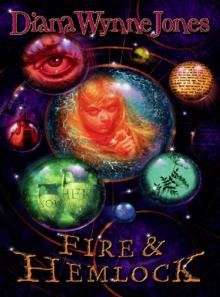 Fire and Hemlock
Fire and Hemlock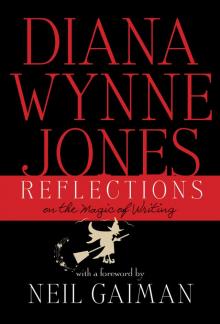 Reflections: On the Magic of Writing
Reflections: On the Magic of Writing The Game
The Game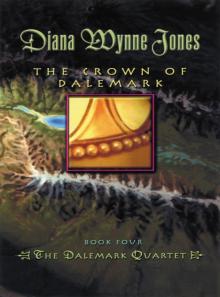 The Crown of Dalemark
The Crown of Dalemark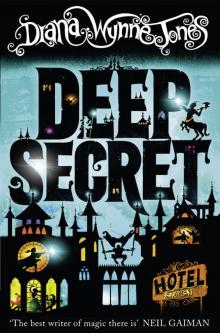 Deep Secret
Deep Secret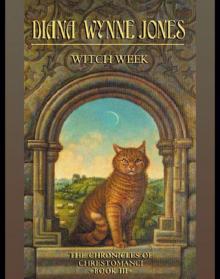 Witch Week
Witch Week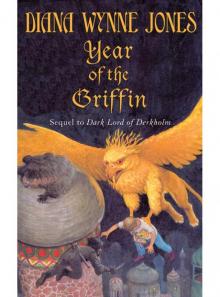 Year of the Griffin
Year of the Griffin Wild Robert
Wild Robert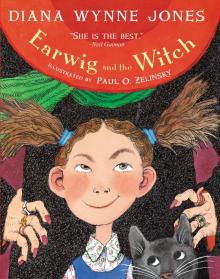 Earwig and the Witch
Earwig and the Witch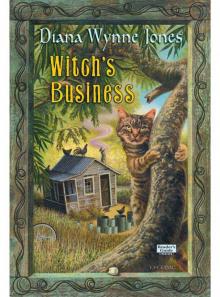 Witch's Business
Witch's Business Dogsbody
Dogsbody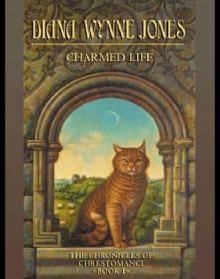 Caribbean Cruising
Caribbean Cruising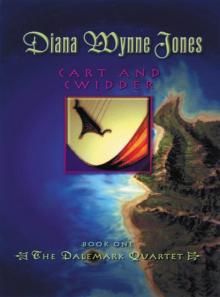 Cart and Cwidder
Cart and Cwidder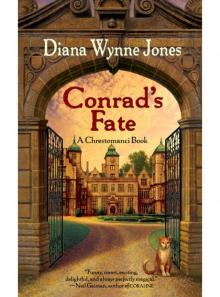 Conrad's Fate
Conrad's Fate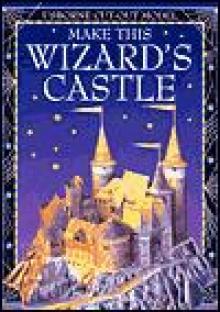 Howl's Moving Castle
Howl's Moving Castle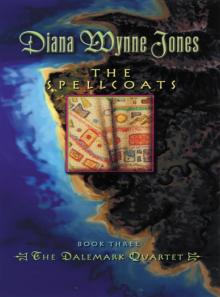 The Spellcoats
The Spellcoats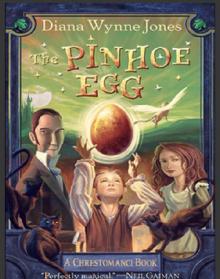 The Pinhoe Egg
The Pinhoe Egg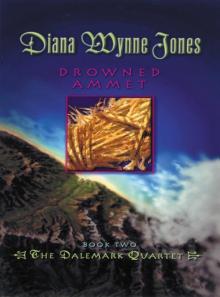 Drowned Ammet
Drowned Ammet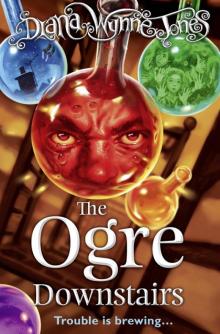 The Ogre Downstairs
The Ogre Downstairs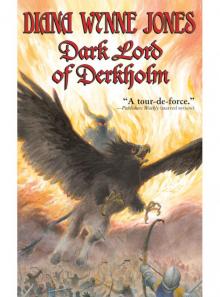 Dark Lord of Derkholm
Dark Lord of Derkholm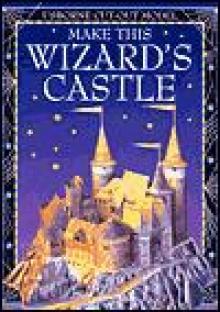 Castle in the Air
Castle in the Air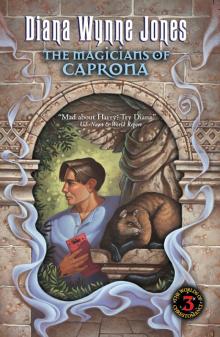 The Magicians of Caprona
The Magicians of Caprona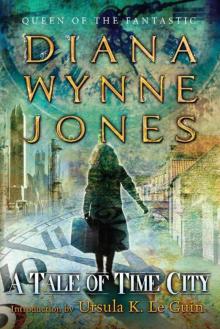 A Tale of Time City
A Tale of Time City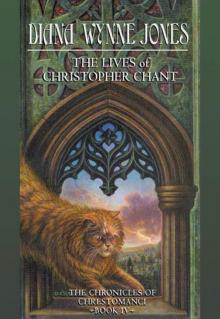 The Lives of Christopher Chant
The Lives of Christopher Chant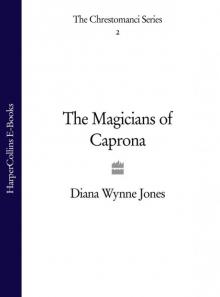 The Magicians of Caprona (UK)
The Magicians of Caprona (UK)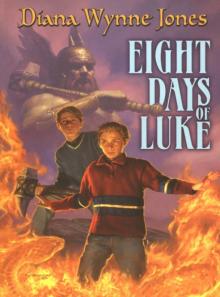 Eight Days of Luke
Eight Days of Luke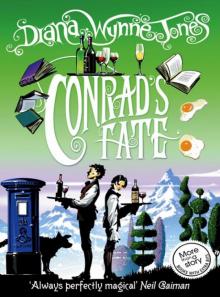 Conrad's Fate (UK)
Conrad's Fate (UK)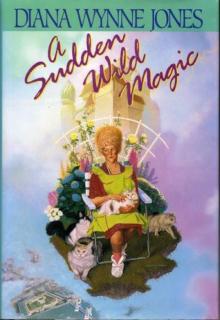 A Sudden Wild Magic
A Sudden Wild Magic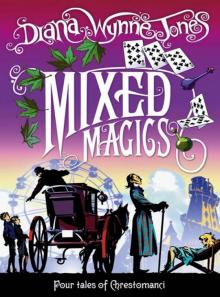 Mixed Magics (UK)
Mixed Magics (UK)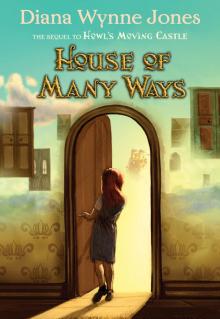 House of Many Ways
House of Many Ways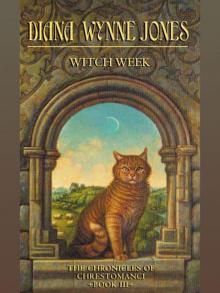 Witch Week (UK)
Witch Week (UK)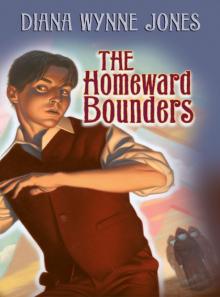 The Homeward Bounders
The Homeward Bounders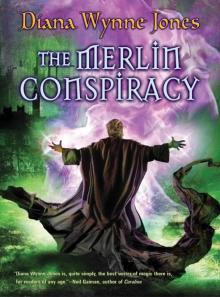 The Merlin Conspiracy
The Merlin Conspiracy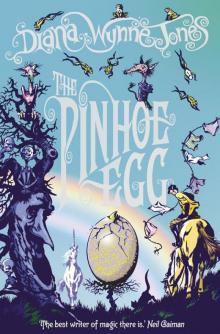 The Pinhoe Egg (UK)
The Pinhoe Egg (UK)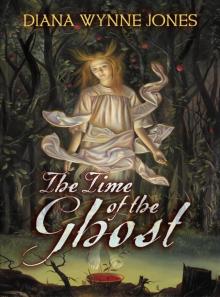 The Time of the Ghost
The Time of the Ghost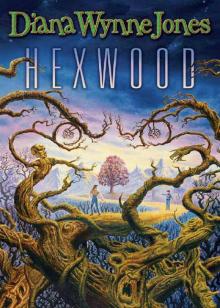 Hexwood
Hexwood Enchanted Glass
Enchanted Glass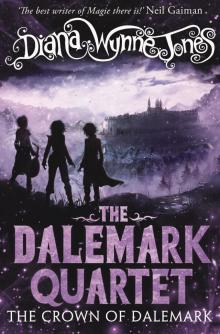 The Crown of Dalemark (UK)
The Crown of Dalemark (UK)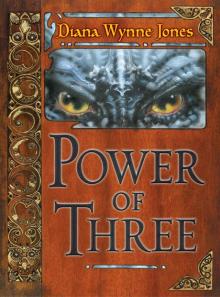 Power of Three
Power of Three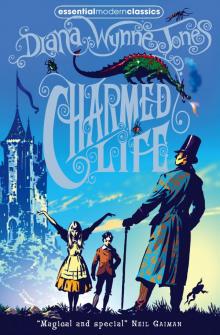 Charmed Life (UK)
Charmed Life (UK)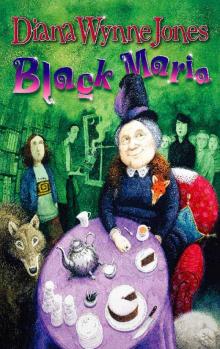 Black Maria
Black Maria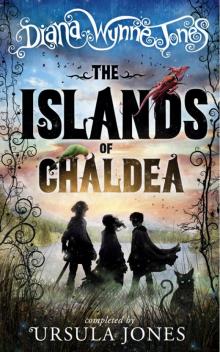 The Islands of Chaldea
The Islands of Chaldea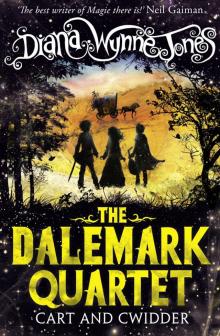 Cart and Cwidder (UK)
Cart and Cwidder (UK)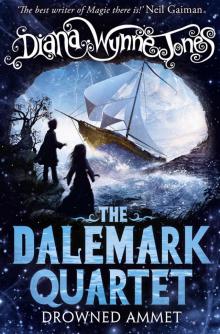 Drowned Ammet (UK)
Drowned Ammet (UK)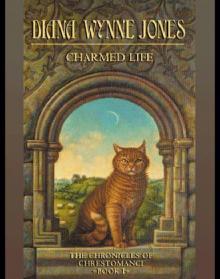 Charmed Life
Charmed Life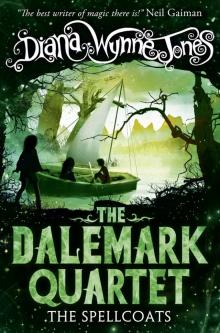 The Spellcoats (UK)
The Spellcoats (UK)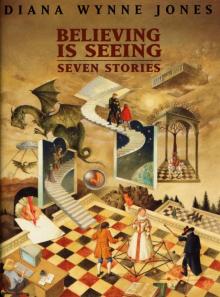 Believing Is Seeing
Believing Is Seeing Samantha's Diary
Samantha's Diary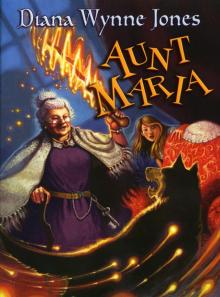 Aunt Maria
Aunt Maria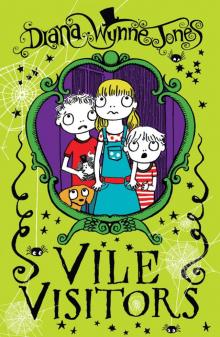 Vile Visitors
Vile Visitors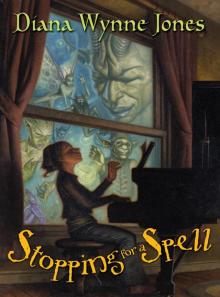 Stopping for a Spell
Stopping for a Spell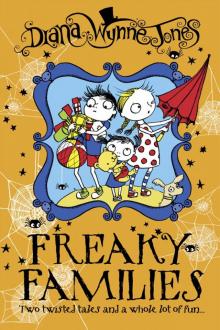 Freaky Families
Freaky Families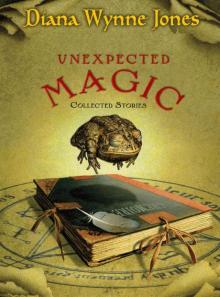 Unexpected Magic
Unexpected Magic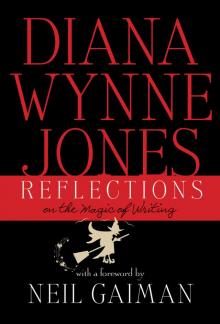 Reflections
Reflections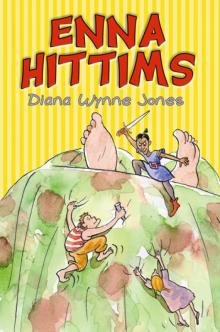 Enna Hittms
Enna Hittms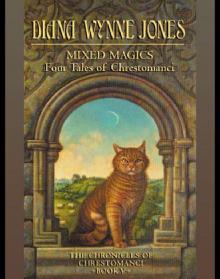 Mixed Magics: Four Tales of Chrestomanci
Mixed Magics: Four Tales of Chrestomanci